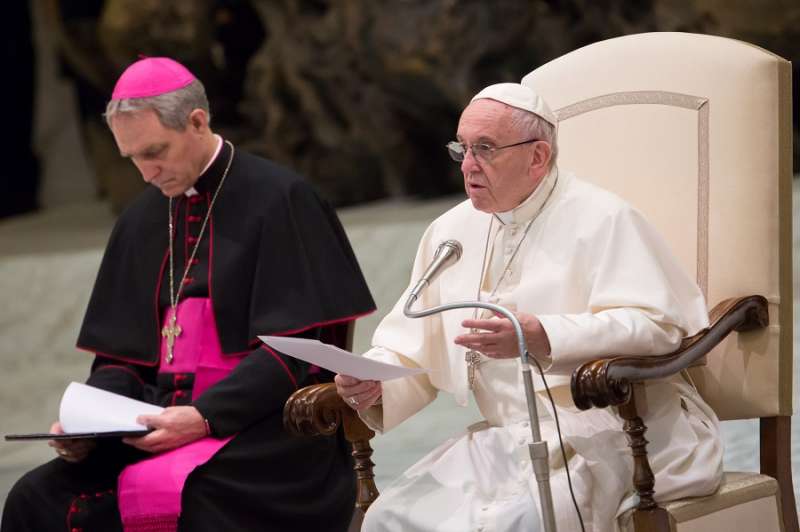When praying, remember the words of Jesus when he taught the ‘Our Father,’ Pope Francis said Wednesday, meeting God as his beloved child and speaking from the heart.
Some think that to pray is to use many words. “I too think of many Christians who believe that praying is to talk to God like a parrot, no! Praying is done from the heart, from inside,” the pope said Jan. 2.
“He does not need anything, our God: in prayer he asks only that we keep open a channel of communication with him to always discover ourselves [to be] his beloved children and [that] he loves us so much.”
In his first general audience of 2019, Pope Francis continued his teaching on the ‘Our Father’ by reflecting on the context in which Jesus taught the prayer to his followers.
When Jesus introduces the ‘Our Father’ as a way to pray, he at the same time distances himself from two types of people and two other ways of praying, the pope said.
The first way is the mode of the hypocrite, who when he prays wants to be seen and admired, he said, noting that this is like the scandal of people who often go to Church, but then turn around and spread hate, speaking badly about people. "This is a scandal! Better not to go to church: live like that, as an atheist," he said.
Christians, he added, should strive to give witness, not a counter-witness. He pointed out that Jesus also distances himself from the “babble” of pagans, “who think they will be heard because of their many words.”
The pope explained that in this passage, Jesus might be alluding to a type of “captatio benevolentiae” – the idea in ancient pagan worship that the gods had to be first placated by a long list of praises.
“Christian prayer, on the other hand, has no other credible testimony than its own conscience,” he said, “where a continuous dialogue with the Father intertwines intensely: ‘When you pray, go into your room, close the door and pray to your Father, who is in secret.’”
Jesus, Pope Francis said, teaches his disciples to turn to God in prayer, as a child turns to his or her father, who already knows “what things he needs before he asks them.”
He recalled that in the Gospel of Matthew, Jesus’ words on how to pray are said in the middle of his Sermon on the Mount, when he “summarizes fundamental aspects of his message.”
Beginning with the Beatitudes, Jesus “crowns with happiness” a series of people who are often forgotten or ignored: the poor, the meek, the merciful, the humble, he said. “This is the revolution of the Gospel. The Gospel does not leave [us] quiet, it pushes us.”
Francis noted Jesus’ words on the mount, that he came not to abolish the law but to fulfill it, and explained that Christ leads his people back to the original meaning of the law: “If a person has a good heart, predisposed to love, then he understands that every word of God must be incarnated until its ultimate consequences.”
Jesus’ words in the sermon on the mount, can appear to be “a moral discourse” with an “exacting ethic,” but above all they are theological, he said. “Here is the great secret that underlies all the talk of the mountain: be sons of your Father who is in heaven.”
The pope emphasized that a Christian is not someone who is concerned with being better than everyone else – Christians know that they are also sinners – but with the revelation of the ‘Our Father,’ they also know themselves to be children of God.
Calling him ‘Father,’ he stated, Christians let themselves be renewed by his power “to reflect a ray of his goodness for this world so thirsty for good, so in expectation of good news.”

